Munich Center of Excellence
CIPSM brings together internationally recognized scientists in the Munich area from the two leading Universities in Germany, LMU and TUM, as well as from the neighbouring Max Planck Institutes and the Helmholtz society. CISPM forms an umbrella under which the individual research facilities can develop their expertise jointly to form a center of scientific gravity in southern Germany. The Center will strengthen existing expertise by hiring new research groups to working on complementary aspects. These measures will catalyze the transition from classical protein science scattered over the Munich region to a new systemic protein science that is expected to dominate research in the molecular life sciences beyond the funding period.
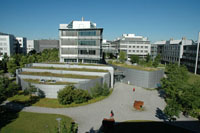
Photogallery: Impressions of Großhadern
CIPSM recruits the majority of the participant members from the LMU in Großhadern and the TUM in Garching and Weihenstephan. This generates two centers of excellence for CIPSM; one in the north, the other in the south. They are spatially linked by the new high way connection in the southwest of Munich (20 min. drive) and by the subway U6 which now provides a direct Campus to Campus connection.
In 1994 the Gene Center moved onto the new Campus in Großhadern/Martinsried. The faculty of Chemistry and Pharmacy, with its department of Chemistry/Biochemistry and the department of Pharmacy was established on the Campus in 1999.
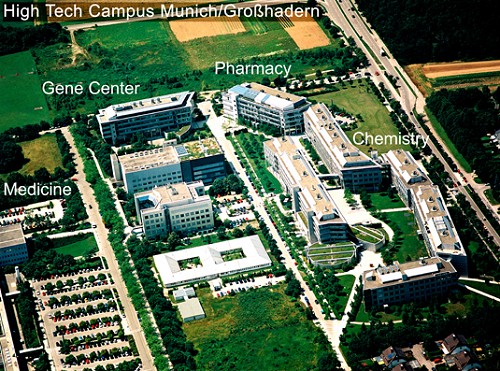
The department of Biology II is present on the Campus since 2005. The Max Planck Institutes for Biochemistry and Neurobiology and the Innovation-Center Biotechnology are present in the direct neighbourhood of Martinsried in walking distance. The department of Biology I will move onto the Campus in summer 2008. As part of the overall strategy at LMU one goal of CIPSM will be to move the LMU BioMedical Center from the city of Munich onto the Campus in Großhadern/Martinsried. The Wissenschaftsrat has given this task highest priority in its statement about the development of the faculty of Medicine at LMU Munich. In a second phase LMU plans to move also the Physics department into a new building on the Campus. This will be required to integrate LMU Biophysics into the Biology/Chemistry and Medicine environment on the new Campus. The major teaching activities of CIPSM will be established within the School of Science at the LMU, in which the traditional borders between disciplines are waived. The idea is to establish in the south of Munich a research area with the focus on systemic protein sciences in which also the chemical manipulation of protein networks and the (structural) analysis of protein complexes is performed.
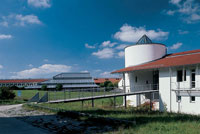
Photogallery: Impressions of Weihenstephan
In the north of Munich, at TUM, a campus with emphasis on the molecular analysis of proteins, protein engineering, and biotechnological application will be created at Weihenstephan and Garching, which are both in close vicinity. At Weihenstephan, CIPSM will benefit from the recent restructuring of the TUM “Life Science Center” and in particular from the formation of a department of “Fundamental Biosciences”, with its activities in protein engineering, membrane protein research, and proteomics. This includes protein structural studies particularly in Weihenstephan, and analysis of protein dynamics by NMR in Garching.
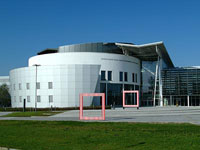
Photogallery: Impressions of Garching
Protein folding, enzymology, biotechnology and medicinal chemistry are renowned areas of protein research in the north of Munich. The departments will closely interact with the newly founded “Institutes of Neuroscience and of Pharmacology”. These Institutes, together with the Clinical Research groups located at the university clinics “Rechts der Isar”, have already an active collaboration. Some of the directions planned for future research in this area were recently expressed and evaluated in the strategic program InnovaTUM. A new joint "Institute for Protein Research and Technology" will be established in order to promote close spatial contact between the groups working on the fundamental and applied aspects of protein science. Junior research groups are planned to be an integral part of this institute. For Garching it has been agreed that the Chemistry building will be fully renovated within the next years. This commitment by the Bavarian government will strengthen the competetiveness of the Campus Garching and will allow this science park to attract excellent researchers.
InnovaTUM is an initiative which, in the course of 2004 to 2008, internally redistributes 420 positions (professors, staff scientists, technical personnel) between the different faculties and departments in a competitive procedure with the aim to improve interdisciplinary research at TUM. As part of this strategic effort the biological sciences will be strengthened at the campuses Weihenstephan, Garching, and MRI/Biederstein. Especially at Weihenstephan, in the North of Munich, the fundamental biological sciences will be boosted by establishing new professorships (e.g. protein bioanalytics, peptide biochemistry, cell culture technology), thus providing not only a better link to the field of life science engineering on this campus but also improving synergies with the research areas of biochemistry, biophysical chemistry, biophysics, and biotechnology at the campus Garching as well as with medical research at the Klinikum Rechts der Isar (MRI).
In summary, the basis for CIPSM; will be three modern, fully renovated or even brand-new science areas (Großhadern, Garching, Weihenstephan). This will give CIPSM the highly attractive environment to enable recruitment of the best scientists on all levels. CIPSM will strengthen basic and biomedical research in Großhadern/Martinsried in the south-west of Munich with a strong emphasis on “proteins in systems”. Investigation of molecular protein function, design, folding, dynamics and engineering will be strengthened in Garching and Weihenstephan, in the north of Munich.
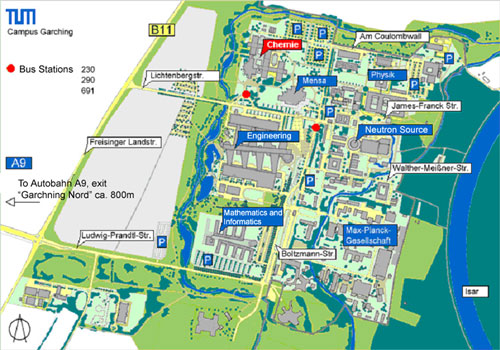
TUM campus in Garching. The department of chemistry is indicated in red. This building will be fully renovated within the next few years. A close interaction with the nearby GSF (only 3 km distance from the Garching campus) is established.










